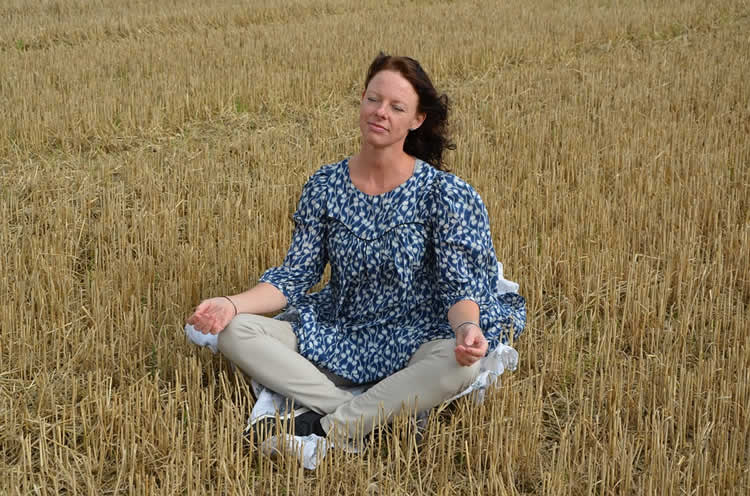Summary: Researchers report practicing simple meditation and listening to music can have benefits for those with preclinical memory loss.
Source: IOS PRESS.
Meditation and music improve memory and cognitive function in adults with subjective cognitive decline: A pilot randomized controlled trial.
In a recent study of adults with early memory loss, a West Virginia University research team lead by Dr. Kim Innes found that practice of a simple meditation or music listening program may have multiple benefits for older adults with preclinical memory loss.
In this randomized controlled trial, 60 older adults with subjective cognitive decline (SCD), a condition that may represent a preclinical stage of Alzheimer’s disease, were assigned to either a beginner meditation (Kirtan Kriya) or music listening program and asked to practice 12 minutes/day for 12 weeks. As detailed in a paper recently published by the Journal of Alzheimer’s Disease, both the meditation and music groups showed marked and significant improvements in subjective memory function and objective cognitive performance at 3 months. These included domains of cognitive functioning most likely to be affected in preclinical and early stages of dementia (e.g., attention, executive function, processing speed, and subjective memory function). The substantial gains observed in memory and cognition were maintained or further increased at 6 months (3 months post-intervention).
As explained in the research team’s previous paper, both intervention groups also showed improvements in sleep, mood, stress, well-being and quality of life, with gains that were that were particularly pronounced in the meditation group; again, all benefits were sustained or further enhanced at 3 months post-intervention.

The findings of this trial suggest that two simple mind-body practices, Kirtan Kriya meditation and music listening, may not only improve mood, sleep, and quality of life, but also boost cognition and help reverse perceived memory loss in older adults with SCD.
Source: Olivia Pape – IOS PRESS
Image Source: NeuroscienceNews.com image is in the public domain.
Original Research: Abstract for “Meditation and Music Improve Memory and Cognitive Function in Adults with Subjective Cognitive Decline: A Pilot Randomized Controlled Trial” by Innes, Kim E.; Selfe, Terry Kit; Khalsa, Dharma Singh; and Kandati, Sahiti in Journal of Alzheimer’s Disease. Published online January 17 2017 doi:10.3233/JAD-160867
[cbtabs][cbtab title=”MLA”]IOS PRESS “Meditation and Music May Help Reverse Early Memory Loss in Adults.” NeuroscienceNews. NeuroscienceNews, 23 January 2017.
<https://neurosciencenews.com/music-meditation-memory-loss-5994/>.[/cbtab][cbtab title=”APA”]IOS PRESS (2017, January 23). Meditation and Music May Help Reverse Early Memory Loss in Adults. NeuroscienceNew. Retrieved January 23, 2017 from https://neurosciencenews.com/music-meditation-memory-loss-5994/[/cbtab][cbtab title=”Chicago”]IOS PRESS “Meditation and Music May Help Reverse Early Memory Loss in Adults.” https://neurosciencenews.com/music-meditation-memory-loss-5994/ (accessed January 23, 2017).[/cbtab][/cbtabs]
Abstract
Meditation and Music Improve Memory and Cognitive Function in Adults with Subjective Cognitive Decline: A Pilot Randomized Controlled Trial
Background: While effective therapies for preventing or slowing cognitive decline in at-risk populations remain elusive, evidence suggests mind-body interventions may hold promise. Objectives: In this study, we assessed the effects of Kirtan Kriya meditation (KK) and music listening (ML) on cognitive outcomes in adults experiencing subjective cognitive decline (SCD), a strong predictor of Alzheimer’s disease.
Methods: Sixty participants with SCD were randomized to a KK or ML program and asked to practice 12 minutes/day for 3 months, then at their discretion for the ensuing 3 months. At baseline, 3 months, and 6 months we measured memory and cognitive functioning [Memory Functioning Questionnaire (MFQ), Trail-making Test (TMT-A/B), and Digit-Symbol Substitution Test (DSST)].
Results: The 6-month study was completed by 53 participants (88%). Participants performed an average of 93% (91% KK, 94% ML) of sessions in the first 3 months, and 71% (68% KK, 74% ML) during the 3-month, practice-optional, follow-up period. Both groups showed marked and significant improvements at 3 months in memory and cognitive performance (MFQ, DSST, TMT-A/B; p’s ≤0.04). At 6 months, overall gains were maintained or improved (p’s ≤ 0.006), with effect sizes ranging from medium (DSST, ML group) to large (DSST, KK group; TMT-A/B, MFQ). Changes were unrelated to treatment expectancies and did not differ by age, gender, baseline cognition scores, or other factors.
Conclusions: Findings of this preliminary randomized controlled trial suggest practice of meditation or ML can significantly enhance both subjective memory function and objective cognitive performance in adults with SCD, and may offer promise for improving outcomes in this population.
“Meditation and Music Improve Memory and Cognitive Function in Adults with Subjective Cognitive Decline: A Pilot Randomized Controlled Trial” by Innes, Kim E.; Selfe, Terry Kit; Khalsa, Dharma Singh; and Kandati, Sahiti in Journal of Alzheimer’s Disease. Published online January 17 2017 doi:10.3233/JAD-160867






